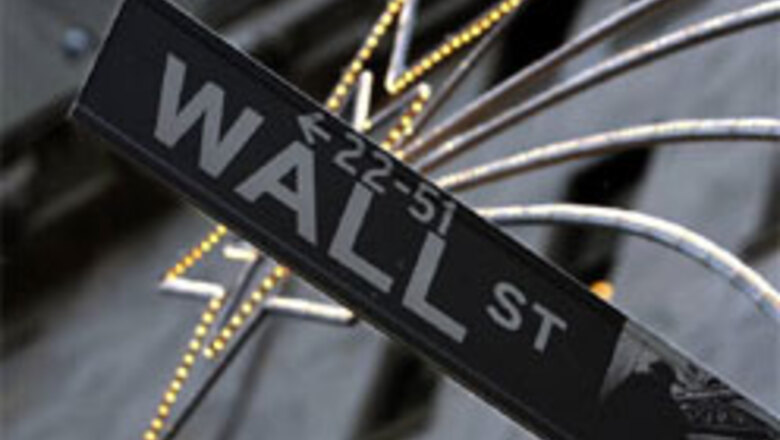
views
New York: Wall Street marked its second-best day ever on Tuesday as investors, convinced that central banks worldwide will cut rates even more, scooped up stocks that had been driven down to their lowest prices in more than five years.
A big catalyst for the late-day surge was a huge drop in the Japanese yen after a news report that the Bank of Japan may cut interest rates later this week.
A sudden strengthening of the yen during the past week had been destabilising stock markets around the world, and Tuesday's reversal of that trend was greeted with relief by investors.
The Federal Reserve is expected to cut its benchmark fed funds rate by at least 50 basis points on Wednesday when it concludes a two-day meeting that began this afternoon.
Shares of capital-hungry companies such as telecoms posted the day's sharpest gains, including Verizon Communications, up over 14 per cent, and AT&T, up over 13 per cent.
Big oil companies gave the Dow its biggest boost after British major BP Plc reported a record quarterly profit, beating expectations.
Exxon Mobil and Chevron both rose more than 13 per cent. Shares of Boeing jumped 15.5 per cent to $48.91 after the aircraft manufacturer reached a tentative agreement with its largest union to end a strike and stop revenue losses estimated at $100 million a day.
Typically when the market gets to oversold extremes, stocks see a bounce back, said Michael Sheldon, chief market strategist at RDM Financial in Westport, Connecticut.
"If you believe that governments around the world are going to be successful in reengerizing financial markets and gradually bringing back confidence and stability in the weeks and months ahead, then you probably want to be more of a buyer than a seller," Sheldon said.
The Dow Jones industrial average jumped 889.35 points, or 10.88 per cent, to 9,065.12.
The Standard & Poor's 500 Index surged 91.59 points, or 10.79 per cent, to 940.51.
The Nasdaq Composite Index ran up 143.57 points, or 9.53 per cent, to 1,649.47.
It was the second-biggest point gain ever for the Dow and the S&P.
These advances were surpassed only by the rally on October 13, when the Dow jumped 936.42 points and the S&P 500 climbed 104.13 points after governments pledged to pour cash into struggling banks and a Japanese banking group completed its investment in Morgan Stanley.
PAGE_BREAK
The yen's recent rally forced an unwinding of the so-called "carry trade" -- a phenomenon of Japan's low interest rates, in which investors borrowed yen to finance investments in high er-yielding assets, such as US stocks.
On Tuesday, the dollar achieved its biggest gain against the yen since 1974, according to Reuters data.
Wall Street also got a lift as investors moved to readjust their stock portfolios as a rough month for stocks draws to a close.
Wal-Mart's stock rose after the world's largest retailer stuck to its 2009 sales growth forecast, saying it will weather the economic turmoil now and could come out even stronger than its rivals when the economy rebounds.
Wal-Mart shot up 11.1 per cent to $55.17 on the New York Stock Exchange.
The rally came despite an economic picture that remained gloomy after data showed US consumer confidence tumbled to a record low in October as the financial crisis made Americans anxious about their jobs and pessimistic about the future.
The gains were widespread, including shares of home builders that rose even in the face of data that showed prices of US single-family homes plunged a record 16 .6 per cent in August from a year earlier.
DR Horton Inc climbed 9.8 per cent to $5.16.
Even the Dow Jones index of home builders' shares finished up 6.01 per cent. Verizon ended at $31.65, up 14.6 per cent, and AT&T finished at $27.61, up 13.2 per cent, in NYSE trading.
In the oil sector, Exxon climbed 13.3 per cent to $74.86, while Chevron soared 13.5 per cent to $70.02.
The big energy producers' shares gained even as front-month US oil futures slipped 49 cents to settle at $62.73 a barrel.
Whirlpool Corp tumbled 8.3 per cent to $45.87 after the world's biggest appliance maker said it would cut seven per cent of its workforce and slashed its 2008 earnings outlook amid weakening demand.
Trading was moderate on the New York Stock Exchange, with about 1.73 billion shares changing hands, below last year's estimated daily average of roughly 1.90 billion.
Most of the volume came in the last hour of trading. On Nasdaq, about 2.77 billion shares traded, above last year's daily average of 2.17 billion.
Advancing stocks outnumbered declining ones on the NYSE by about 4 to 1 while on the Nasdaq, slightly more than two stocks rose for every one that fell.



















Comments
0 comment